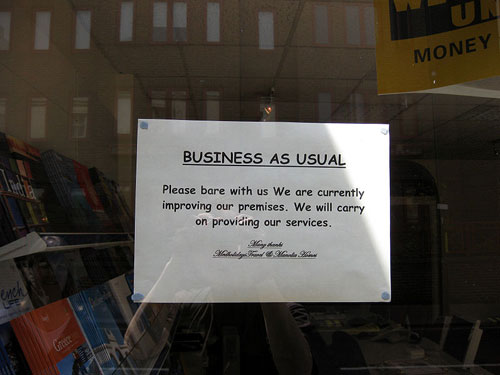
Source: Rebranding?, CarbonNYC, Flickr
You can always look up the spelling of a word in a dictionary or online if you are unsure of what is correct. However, when it comes to a homophone, things can get a little tricky. To figure out which spelling you need, you need to know the meanings of words and how they are used in a sentence. Sometimes it helps to have little tricks or mnemonic devices.
The following chart contains several commonly confused homophones and some mnemonic devices to help you remember how to use them correctly:
| stationary and stationery |
|---|
| Mnemonic device: Stationery contains the letter “e” like the word “envelope,” which relates to the meaning of stationery. |
| miner and minor |
| Mnemonic device: Someone who works in a mine is a miner. A minor is too young to work in a gold or a coal mine. (Mine and miner both contain “e” in their endings; the word “or” helps you remember the spelling of minor, someone who is underage.) |
| principle and principal |
| Mnemonic device: The principal is your pal. (The word “pal” is contained in the word “principal.”) She rules based on principle. (Rule and principle both end with “le.”) |
| effect and affect |
| Connection mnemonic: When your sentence needs a noun, use effect (e.g., Smoking has a detrimental effect on your lungs). Effect is a noun. When your sentence requires a verb, use affect (e.g., Smoking will affect your lungs). Affect is a verb. |

Source: IXS 0337.jpg, Leon Brocard, Wikimedia Commons
The words above are only a few of the homophones that exist. There are literally hundreds. When you are learning the difference between a set of homophones (like hole and whole or weather and whether), try to come up with your own device to help you remember which word to use in a given situation.
Take a look at the paragraph in the text box below. Twenty words are misspelled because the wrong homophone has been used. As you read, click on the words that are misused. If you choose correctly, the word will highlight, and the correct spelling will appear. (Hint: Some words are used more than once.)

So, were you able to find all twenty words? Wasn’t it a bit surprising to see how many common words have a “sound alike”—a homophone? If you were to read this passage aloud, relying only on your ears, it would sound correct.
Now, read the sentences below. Each one contains a confusing pair. Choose the correct answer from each drop-down menu. If you’re not sure which answer is correct, feel free to look up the words in this online dictionary.
